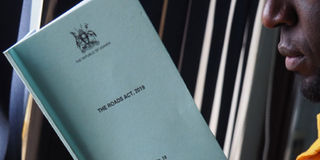Roads Act 2019: Important points to note

As a motorist, you should read the important aspects of the Act. PHOTO BY GABRIEL BUULErtant aspects of the Act. PHOTO BY GABRIEL BUULE
Initially, three laws guided motorists and the public on road etiquette and usage. These were the Roads Act of 1949 that was revised in 1964; the Access to Roads Act of 1969 and the Traffic and Road Safety Act.
The Roads Act of 1949 and the Access to Roads Act involved infrastructure and aspects of planning, construction, maintenance and management while the Traffic and Road Safety Act is about using the road.
Samson Bagonza, the director of engineering and works and engineer-in- chief at the Ministry of Works and Transport, says what the ministry did was combining the Roads Act, Access to Roads Act and formed the Roads Act, 2019. Also, the Traffic and Road Safety Act has been revised to make sure the sections that were repealed in the law and were published in the Roads Act 2019 are not the same.
Safety
Specifically to the Roads Act 2019, part six of the Act emphasises the infrastructure required to make sure anybody using the road is safe. It also has particular emphasis on road furniture such as traffic signs, road markings, guard rails and reflectors, among others, which upon damage and conviction, you are fined 96 currency points or an equivalent of Shs1.92m.
It also recommends driving within the prescribed speed limits (80km/hour on highways and not above 50km/hour in built up areas, which, upon violation, attract a deserving punishment of 168 currency points, equivalent to Shs3.36m.
Offences
Justus Mugarura is one of the motorists happy about some of the revised laws in the Roads Act. For instance, he has seen a number of motorists or occupants who throw rubbish through their car windows.
“If well implemented, the Act will punish those who litter roads,” Mugarura says.
According to Section 63 of the Act, littering the road, just like damaging milestones, culverts, bridges and dams and any road furniture is punishable by a fine of 120 currency points.
This is equivalent to Shs2.4m, with a currency point costing Shs20,000, or imprisonment not exceeding five years, or both.
“If your vehicle is damaged and oil spills on the road in the process of repairing and if you are caught burning tyres or any other material on the road, you will also serve the same punishment upon conviction,” Bagonza emphasises.
Obstructions
The Act also prohibits mixing of building materials such as sand, cement and concrete on the road surface if you have a site near the road.
Anything that you put on the road and it interferes with its smooth running is an offence, which, on conviction, you pay a fine of 24 currency points (Shs480,000) or imprisonment not exceeding one year or both.
Interferences of public roads
Placing unauthorised billboards, especially at night, planting trees, permanent crops on the road reserve without permission, encroaching on a road reserve without authority, carrying out a business activity on the shoulder of a public road or road reserve without permission, intentionally or negligently damaging any part of the road, filling or obstructing any ditch on the road, are all offences subject to a fine of Shs480,000, or imprisonment.
Nuisance
A person who makes and causes noise pollution such as playing loud music from your car, plays any game to the annoyance and danger of people using the public road, pitches any tent without permission of the road authority, makes any fire, especially during demonstrations without permission, places themselves in a road to cause danger and inconvenience to road users, are liable to a fine of 24 currency points (Shs480,000).
Sale of broken down or abandoned vehicles
In a rural area, the Act states that your vehicle is allowed only six hours on the road before you tow it away and in urban areas, it only has two hours regardless of whether it is day or night. If you violate these timelines, traffic police comes in to tow it away at your cost and inconvenience, with or without your consent.
“When your vehicle is not claimed and the expenses of storage and removal are not paid by the owner or person having interest in the vehicle within two months from the date of removal, the police shall cause notice on intention to sell the vehicle by auction to be published in the gazette and in at least two newspapers of national circulation. Ninety days after the notice, the vehicle shall be auctioned,” the Act says.
This, Bagonza, adds, is why it is important to transfer a vehicle when you buy it from someone. If you are the owner and you sold it off and it is not reflecting the current owner, it is the seller who is inconvenienced.
Section four of the Act also stipulates that Road authorities such as local governments, urban councils and Kampala Capital City Authority, among other authorities can close a particular road if it is deemed dangerous to people and also restrict certain vehicles from entering urban areas during the day.




